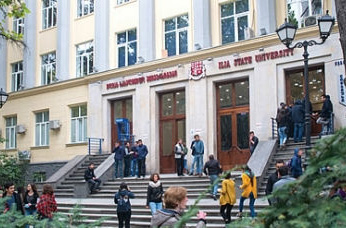
How Cardiff University is helping in the treatment of Post-Traumatic Stress Disorder (PTSD) in Georgia thanks to Erasmus+
Cardiff University expertise is helping to improve the treatment of trauma patients in Georgia as a collaboration which has been a decade in the making comes to fruition thanks to Erasmus+ funding.
Professor Jonathan Bisson's team, based in the Welsh capital, have been working with counterparts at the Ilia State University on two successive Erasmus+ International Credit Mobility (ICM) projects since 2016, creating a training programme in Trauma Focused Cognitive Behavioural Therapy (TF CBT).
Not only is the project contributing to both institutions' internationalisation strategies, it is also helping to improve the understanding of individuals affected by trauma.
The story began more than ten years ago when Professor Bisson, from the Division of Psychological Medicine and Clinical Neuroscience at Cardiff University School of Medicine, was sharing his experience in psychotraumatology with the Georgian community of mental health professionals and psychotraumatologists, looking at how to develop trauma care capacity in Georgia.
The group that came together with him, from Ilia State University (ISU), the Georgian Society of Psychotrauma, the Foundation Global Initiative on Psychiatry and other local organisations, were keen to build a ‘Training of Trainers’ programme in TF CBT for Georgian professionals.
ICM in action
More than €400,000 of Erasmus+ ICM funding has enabled them to turn their idea into reality and has already enabled, among other things, four professors and lecturers from ISU to visit Cardiff University in July 2016 and 2017.
“We were able to get acquainted with the work of the university clinic as a special unit dealing with patients who suffer from traumatic experiences,” said Dr Jana Javakhishvili, Head of the ISU Institute of Addiction Studies. “Cardiff TF CBT therapists generously shared their knowledge with us and we had the opportunity to review their very innovative approach of treating traumatised war veterans.
"We also met Welsh government representatives responsible for mental health care policies. This was a unique learning experience for us; it was very productive and extremely useful. This collaboration has so far resulted in ISU implementing a cascade of training to better support our students and graduates in Trauma Focused CBT. We are also implementing an evaluation study to tailor intervention to the Georgian context and to learn lessons which will allow us to improve trauma focused services in the country.”
 As part of the project, three of the ISU staff were trained as trainers and have gone on to deliver the programme in their own institution and are now supervising ISU students to deliver the manualised treatment to PTSD sufferers in Georgia. Therapy training has been embedded as a core part of ISU’s MSc in Mental Health (Psychotraumatology) curriculum. Staff and students from both Cardiff University and ISU have gained a broad cultural awareness of each other’s countries, in particular their respective research and higher education cultures.
As part of the project, three of the ISU staff were trained as trainers and have gone on to deliver the programme in their own institution and are now supervising ISU students to deliver the manualised treatment to PTSD sufferers in Georgia. Therapy training has been embedded as a core part of ISU’s MSc in Mental Health (Psychotraumatology) curriculum. Staff and students from both Cardiff University and ISU have gained a broad cultural awareness of each other’s countries, in particular their respective research and higher education cultures.
ICM is contributing to the delivery of the internationalisation strategies of both our institutions. It helps to attract talent, facilitate staff and student development and consolidates ongoing strong partnership work.
Cardiff life
“We fell in love with Cardiff University,” Dr Javakhishvili enthused. “The culture within the mental health professionals team, headed by Professor Bisson, is fascinating: friendly, open and open-minded. They were ready to share their knowledge and experience as well as to listen to us and gain an insight into ours. We were very privileged to have had this chance. Thank you Erasmus+.
“We very much enjoyed not only the scientific and professional exchange, but also the human interaction while in Cardiff and the hospitality of our Cardiff University colleagues.
“We visited the ethnographic museum, St Fagans National Museum of History, on the hottest day of the summer! Despite the heat, it was a special experience – we found out that we have a lot of things in common, which was an exciting discovery.”
Continued success
The project has been acknowledged by the international community of psychotraumatologists. Together with Professor Bisson and Professor Marylene Cloitre from California's Stanford University, who they collaborated with on one of the models of TF CBT, the team delivered a workshop at the International Society for Traumatic Stress Studies annual meeting, where they talked about the experiences of implementing their project in Georgia.
In fact, so successful was the initial project that further funding was granted for Cardiff University to carry on with phase two, allowing the co-operation to flourish and grow for another two years.
“The ICM funding will help embed the therapy training as a core part of ISU’s MSc in Mental Health curriculum and will build capacity within ISU through further training for staff and students," said Professor Bisson.
"It will also allow more staff and student exchange trips between both institutions. This successful joint training initiative, funded through Erasmus+, provides a strong platform for future teaching and research initiatives to improve understanding and management of individuals affected by trauma across Europe and beyond.
"ICM is contributing to the delivery of the internationalisation strategies of both our institutions. It helps to attract talent, facilitate staff and student development and consolidates ongoing strong partnership work in education, innovation and research."
Inspired to take part in Erasmus+ International Credit Mobility? Visit our ICM webpage to find out more.
